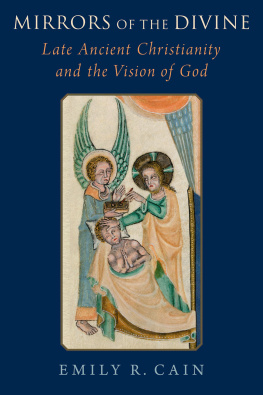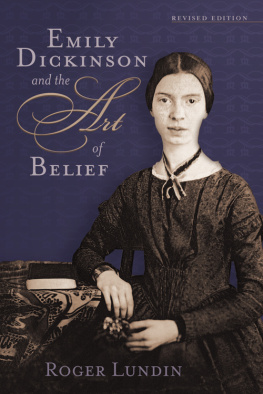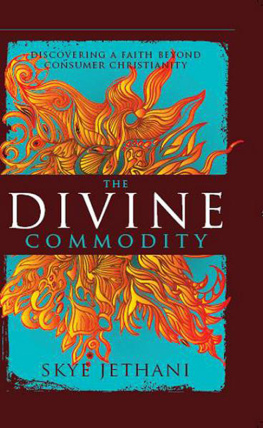Emily R. Cain - Mirrors of the Divine Late Ancient Christianity and the Vision of God
Here you can read online Emily R. Cain - Mirrors of the Divine Late Ancient Christianity and the Vision of God full text of the book (entire story) in english for free. Download pdf and epub, get meaning, cover and reviews about this ebook. year: 2022, publisher: Oxford University Press, genre: Religion. Description of the work, (preface) as well as reviews are available. Best literature library LitArk.com created for fans of good reading and offers a wide selection of genres:
Romance novel
Science fiction
Adventure
Detective
Science
History
Home and family
Prose
Art
Politics
Computer
Non-fiction
Religion
Business
Children
Humor
Choose a favorite category and find really read worthwhile books. Enjoy immersion in the world of imagination, feel the emotions of the characters or learn something new for yourself, make an fascinating discovery.
- Book:Mirrors of the Divine Late Ancient Christianity and the Vision of God
- Author:
- Publisher:Oxford University Press
- Genre:
- Year:2022
- Rating:5 / 5
- Favourites:Add to favourites
- Your mark:
- 100
- 1
- 2
- 3
- 4
- 5
Mirrors of the Divine Late Ancient Christianity and the Vision of God: summary, description and annotation
We offer to read an annotation, description, summary or preface (depends on what the author of the book "Mirrors of the Divine Late Ancient Christianity and the Vision of God" wrote himself). If you haven't found the necessary information about the book — write in the comments, we will try to find it.
Emily R. Cain: author's other books
Who wrote Mirrors of the Divine Late Ancient Christianity and the Vision of God? Find out the surname, the name of the author of the book and a list of all author's works by series.
Mirrors of the Divine Late Ancient Christianity and the Vision of God — read online for free the complete book (whole text) full work
Below is the text of the book, divided by pages. System saving the place of the last page read, allows you to conveniently read the book "Mirrors of the Divine Late Ancient Christianity and the Vision of God" online for free, without having to search again every time where you left off. Put a bookmark, and you can go to the page where you finished reading at any time.
Font size:
Interval:
Bookmark:


Oxford University Press is a department of the University of Oxford. It furthers the Universitys objective of excellence in research, scholarship, and education by publishing worldwide. Oxford is a registered trade mark of Oxford University Press in the UK and certain other countries.
Published in the United States of America by Oxford University Press
198 Madison Avenue, New York, NY 10016, United States of America.
Oxford University Press 2023
All rights reserved. No part of this publication may be reproduced, stored in a retrieval system, or transmitted, in any form or by any means, without the prior permission in writing of Oxford University Press, or as expressly permitted by law, by license, or under terms agreed with the appropriate reproduction rights organization. Inquiries concerning reproduction outside the scope of the above should be sent to the Rights Department, Oxford University Press, at the address above.
You must not circulate this work in any other form and you must impose this same condition on any acquirer.
CIP data is on file at the Library of Congress
ISBN 9780197663370
eISBN 9780197663394
DOI: 10.1093/oso/9780197663370.001.0001
The idea for this book began with a passing observation during the first year of my doctoral program at Fordham: after reading Augustines de Trinitate and Gregory of Nyssas Life of Moses, I noticed that both authors used the same metaphor of seeing God through a mirror, darkly in related, but inverted ways. From this seemingly simple observation, I formed an enduring question: why? While we may never answer questions of motivation, I began my own foray into the what and the how of this difference, studying ancient theories of sight and the history of mirrors and reflection. As my explorations led me earlier and earlier, I realized that writing on vision was more intricate than I first supposed.
Metaphors, of course, mean different things to different people and in different contexts, and metaphors of vision and mirrors are especially complex. They connect the body and the mind, the human and the divine, the self and the other. They open into new worlds, and they connect to ideas of morality, knowledge, and self-identity. Yet the part that stood out to me the most was the idea that each of us sees the world differently.
My ideas surrounding vision and mirrors have been sharpened by excellent conversations and feedback at a variety of conferences: the North American Patristics Society, the Oxford Patristics Conference, and the International Colloquium on Gregory of Nyssa. Both anonymous reviewers of the manuscript offered insightful feedback, which helped me to draw out my significance and framing more clearly.
Earlier versions of some chapters have been published as journal articles. Some of the examples of et al. (Leuven: Peeters, 2021), 16775. I am grateful to these publishers for permission to reuse parts of those articles.
My time at Fordham was especially formative, and I benefitted from the guidance of George Demacopoulos, Maureen Tilley, Larry Welborn, Robert Davis, Benjamin Dunning, and Sarit Kattan-Gribetz. My chapter on Clement of Alexandria developed in conversation with colleagues for a special issue, and I am grateful for the helpful feedback of Kristi Upson-Saia, Jessica Wright, Jared Secord, and John Penniman.
I rewrote the project entirely during my time at Loyola, and this was only possible with support from excellent friends and colleagues, especially Kristen Irwin, Tisha Rajendra, Sandra Sullivan-Dunbar, Teresa Calpino, Lauren OConnell, Aana Vigen, Xueying Wang, and Thomas Wetzel. I am especially grateful, as well, to those friends and colleagues who read and offered feedback on various drafts: Devorah Schoenfeld, Mara Brecht, Mark Lester, Olivia Stewart Lester, Josefrayn Snchez-Perry, Ashley Purpura, Matthew Briel, Adam Ployd, and Lindsey Mercer. This book is immensely stronger for the input of each, and all errors left are my own. Finally, this book wouldnt have been possible without the constant support of my husband, Ben. Thank you.
How an author portrays eyes reveals how she understands the world, while how she portrays mirrors reveals how she imagines the unknown.
Eyes and mirrors function not only as symbols within stories, but they also serve as frequent metaphors in language. Modern English regularly pairs sight with knowledge, such as I see what you mean or Do you see what Im saying? Mirror metaphors are associated with imitation, of course, but also with reflection or self-knowledge. These rhetorical links are so common today that they have become inert metaphors, mere remnants of a scientific belief long since gone. What might seem to be mere science fiction today has its roots in ancient science, with different assumptions about the science of sight and mirrors.
These differing assumptions impact vision far beyond the basic mechanics of sight. In his fragmented text On Love from near the end of the first century CE, Plutarch noted that if all people were to see the same things in the same ways, then everyone would fall in love with the same person. The diversity of loves, he argued, demonstrates that the eyes are not impartial; they can be trained by art or developed by nature.or not at alland the presence or absence of sight becomes a productive place to think about what it means to be human: revealing assumptions about who you are, what you can know, and how you can act.
The world looks different when one sees differently, and when we take sight for granted in these ancient texts, we miss fundamental assumptions about the subjective experiences of humanity. How we understand perception shapes what and how we see and also our broader senses of self, and to miss how sight worked for these late ancient authors, therefore, is to look past some of the most self-conscious ways that late ancient Christians thought of themselves, their worlds, and their God. How do I know and interact with the world? What does it mean to see God? Can one see God in this life? If so, how and to what extent? And how is one impacted by sight?
This book asks precisely those questions, seeking to bring into focus how four influential late ancient authorsTertullian of Carthage, Clement of Alexandria, Gregory of Nyssa, and Augustine of Hippoemploy language of vision and of mirrors in their discursive struggles to construct Christian agency, identity, and epistemology. These authors span from the second through fourth centuries CE in both Eastern and Western Christianity, and I analyze their theological writings on vision and knowledge of God to explore how they pieced together rival and contradictory theories of sight to shape their cosmologies, theologies, subjectivities, genders, and discursive worlds. The different theories of vision partly answered the question of how we see; but more, the differences around vision and mirrors offer a keyhole into questions of the relationships between heaven and earth, body and soul, men and women, and beyond.
Each early Christian author describes the vision of God through the Pauline verse For now we see in a mirror, dimly, but then we will see face to face, and each ties this metaphor of a flawed vision of God to an understanding of a distinctly flawed human body.dramatic impacts on how one interprets what it means to see God through a mirror, dimly.
Font size:
Interval:
Bookmark:
Similar books «Mirrors of the Divine Late Ancient Christianity and the Vision of God»
Look at similar books to Mirrors of the Divine Late Ancient Christianity and the Vision of God. We have selected literature similar in name and meaning in the hope of providing readers with more options to find new, interesting, not yet read works.
Discussion, reviews of the book Mirrors of the Divine Late Ancient Christianity and the Vision of God and just readers' own opinions. Leave your comments, write what you think about the work, its meaning or the main characters. Specify what exactly you liked and what you didn't like, and why you think so.









